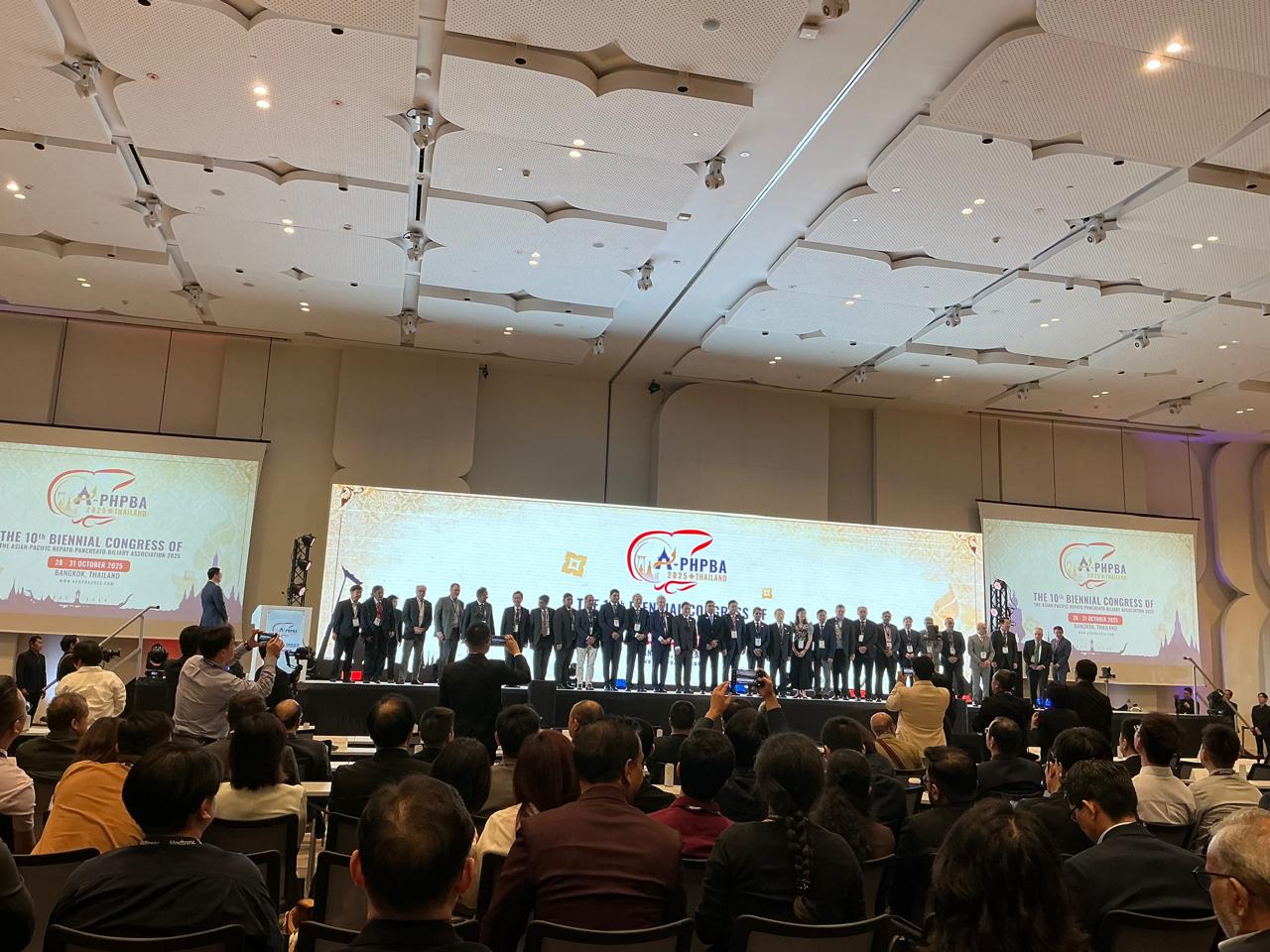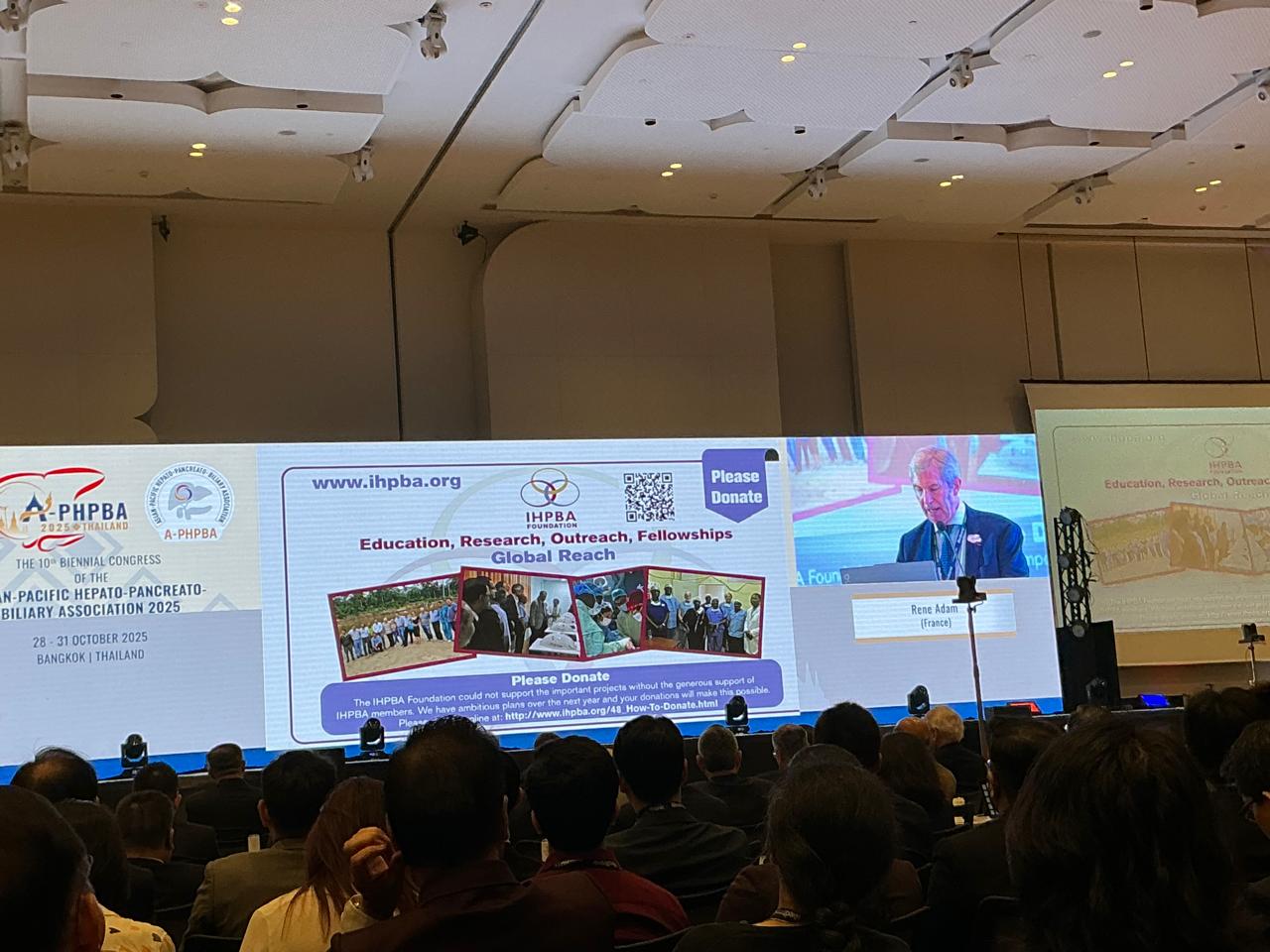The Asian-Pacific Hepato-Pancreato-Biliary Association (A-PHPBA) 2025 Congress was held from 28-31st October 28, 2025, in Bangkok, Thailand. This landmark gathering brought together surgeons, researchers, and educators from across the world to discuss advances in liver, pancreas, and biliary surgery. The congress was organized under the leadership of Assoc. Prof. Dr. Anon Chotirosniramit, President of the Thai HPB Association and Chairman of the A-PHPBA 2025 Organizing Committee, providing a platform to share expertise, foster mentorship, and celebrate collaboration across the region.
Modern surgery is no longer defined only by technical mastery. The field of hepatopancreatobiliary (HPB) surgery—which addresses complex diseases of the liver, pancreas, and biliary system—is entering an era shaped by artificial intelligence, molecular medicine, and robotic-assisted procedures. These technologies are redefining how surgeons plan operations, operate with precision, and evaluate outcomes. Yet, beyond the scalpel, a new culture is emerging: one of collaboration, mentorship, and shared learning.
I had the privilege of attending the congress. The congress demonstrated that modern surgery is as much about learning and sharing as it is about performing procedures. Each session, discussion, and presentation emphasized the importance of mentorship, documentation, and collaboration. Every procedure, every research finding, and every patient outcome contributes to a larger puzzle that the global HPB community is piecing together.
One of the most striking highlights was the consensus meeting on Intraductal Papillary Neoplasms of the Bile Duct (IPNB). This rare but challenging condition demands careful diagnosis and management. Experts from Japan, Korea, Thailand, China, the United States, Europe, Australia, New Zealand, and Africa came together to harmonize treatment guidelines. Watching surgeons from vastly different healthcare systems collaborate reminded me that knowledge knows no borders, and even countries with limited resources can benefit when global expertise is shared.

The congress also showcased initiatives designed to empower early-career surgeons by IHPBA, particularly those from low- and middle-income countries like Nepal. Programs such as HPB Bridge multidisciplinary team (MDT) meetings, Surgical Outcome Registries, and research and travel grants provide young surgeons with opportunities to learn globally while serving their local communities. For me, seeing these pathways in action was inspiring—it’s a tangible reminder that global collaboration can accelerate local progress. Progress. I also had the opportunity to meet many early-career surgeons from across the region, laying the foundation for future collaboration and shared learning, which was truly encouraging.
Prof. Timothy Pawlik from the United States shared valuable insights on intrahepatic cholangiocarcinoma (ICC), highlighting how careful preoperative planning, staging, and patient selection improve outcomes. He also emphasized how artificial intelligence, molecular profiling, and targeted therapies are reshaping the future care of these patients
Several moments and messages left a lasting impression. Prof. Shailesh Shrikhande shared a simple yet profound lesson, quoting Henry Ford: “Quality is doing right even when nobody is watching.”
These words capture the essence of surgical integrity—the unseen discipline, teamwork, and meticulous effort that underpin every successful operation.
Equally moving was the story of Prof. Chen Chao-Long from Taiwan, a pioneer in liver transplantation. He traveled across continents to learn the techniques of transplantation and brought these lessons home, establishing programs that now save lives across Asia. His words resonated deeply: “Medicine is about saving lives—it has no place for egoism.”
This theme of humility and service ran throughout the congress. The wisdom of Prof. Thomas Starzl echoed repeatedly: “What was inconceivable yesterday and barely achievable today often becomes routine tomorrow.”
From the first-ever report of intraductal papillary mucinous neoplasms (IPMN) by Ohashi et al., to Prof. Tanaka’s work in Japan shaping global guidelines, I witnessed firsthand how persistence, focus, and incremental progress can transform patient care. A single case report, when carefully documented and shared, can ripple across decades to become the foundation of worldwide practice.

The congress also highlighted the exceptional teaching and surgical expertise of Japanese, Korean, and Thai colleagues in managing biliary tract cancers. Their precision, innovative approaches and dedication to training the next generation set global benchmarks. Similarly, Chinese research groups, led by experts like Prof. Yingbin Liu, demonstrated how meticulous documentation, research rigor, and structured collaboration could elevate care even in resource-limited settings.
In Europe, the work of Prof. Thilo Hackert in Germany—emphasizing careful data collection, audits, and classification systems—provided another model for excellence. From Tata Memorial Hospital in India to colleagues across the United States, Europe, Australia, New Zealand, and South Africa, it was evident that science grows stronger when shared and that collaboration transcends borders.
For early-career surgeons like me, these lessons are invaluable. Technology may guide our hands, but mentorship, collaboration, and compassion guide our hearts. Global progress in HPB surgery depends not just on innovation, but also on shared purpose, humility, and the willingness to learn from one another.
Returning home to Nepal, I carry a renewed sense of purpose. My mission is to learn deeply, teach widely, and bridge experience with evidence. I hope to bring the lessons of #APHPBA2025 to my patients, colleagues, and the wider medical community—ensuring that the benefits of global innovation in liver and pancreatic surgery reach every corner of the world.
The future of HPB surgery is bright. It lies not only in cutting-edge technology, but also in the spirit of collaboration, mentorship, and shared knowledge that defines our profession. For early-career surgeons, the message is clear: seek knowledge, document your learning, teach generously, and always put patients first.
________________________________________
Dr. Uttam Laudari, MCh, is a Gastrointestinal and Hepatopancreatobiliary (HPB) Surgeon at Kathmandu Medical College, Nepal. He recently attended the A-PHPBA 2025 Congress in Bangkok.


